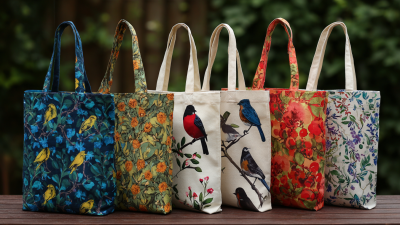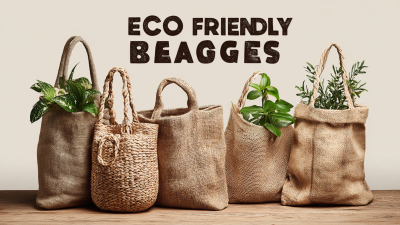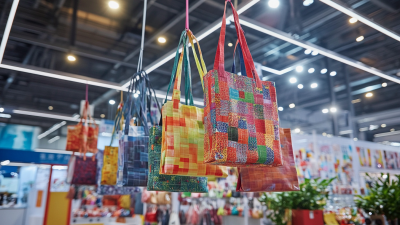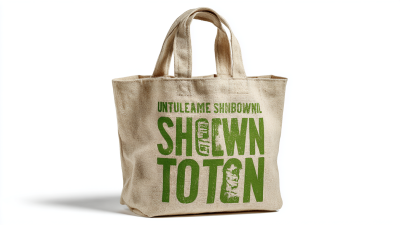In an era where environmental consciousness is becoming increasingly critical, the conversation surrounding packaging solutions has evolved significantly. Traditional packaging methods, often reliant on single-use plastics and other non-biodegradable materials, come with hidden costs that extend beyond mere dollar signs. In contrast, Eco Friendly Tote Bags have emerged as a sustainable alternative that not only reduces waste but also promotes a greener lifestyle.
 These versatile bags not only serve practical purposes but also symbolize a growing movement towards reducing our environmental footprint. This blog will delve into the myriad benefits of Eco Friendly Tote Bags and highlight the potential
long-term savings they offer compared to conventional packaging solutions, urging consumers and businesses alike to reconsider their choices and invest in a more sustainable future.
These versatile bags not only serve practical purposes but also symbolize a growing movement towards reducing our environmental footprint. This blog will delve into the myriad benefits of Eco Friendly Tote Bags and highlight the potential
long-term savings they offer compared to conventional packaging solutions, urging consumers and businesses alike to reconsider their choices and invest in a more sustainable future.
 Eco-friendly tote bags have emerged as a sustainable choice for individuals and businesses looking to reduce their environmental impact. Unlike traditional packaging solutions, which often contribute to significant waste and pollution, eco-friendly tote bags are made from sustainable materials that are designed to last. These bags not only provide a practical alternative for shopping but also promote a lifestyle centered around conservation and environmental stewardship.
Eco-friendly tote bags have emerged as a sustainable choice for individuals and businesses looking to reduce their environmental impact. Unlike traditional packaging solutions, which often contribute to significant waste and pollution, eco-friendly tote bags are made from sustainable materials that are designed to last. These bags not only provide a practical alternative for shopping but also promote a lifestyle centered around conservation and environmental stewardship.
To make the most of your eco-friendly tote bags, consider these tips: First, always keep a few folding tote bags in your car or purse to ensure you have them handy when shopping. This helps prevent impulse buys of single-use plastic bags. Second, opt for tote bags made from organic cotton or recycled materials, as they tend to have a lower carbon footprint. Lastly, get creative and use your tote bags for multiple purposes—such as carrying gym gear, packing for a picnic, or organizing your workspace—to extend their life and versatility.
By choosing eco-friendly tote bags, you're not only embracing a sustainable alternative but also contributing to a larger movement toward responsible consumption. The benefits extend beyond just reducing waste; they inspire others to follow suit and make more environmentally conscious choices in their daily lives.
The environmental impact of traditional packaging solutions has become a pressing concern as awareness grows regarding their detrimental effects on our planet. Traditional materials, primarily plastics, contribute significantly to pollution and landfill waste. As we strive for sustainability, alternative packaging options—including compostable and biodegradable materials—are gaining traction. The compostable packaging market, for example, is projected to grow due to increasing demand for eco-friendly solutions that minimize environmental footprints.
To make better packaging choices, consider the materials you use. Opt for options like polylactic acid (PLA), bamboo, or cellulose, which not only break down more easily but also reduce reliance on fossil fuels. Moreover, as the recycled packaging market expands, it’s essential to prioritize products made from recycled materials, contributing to a circular economy.
**Tips:** When shopping, look for certifications that signify sustainable and biodegradable practices. Additionally, supporting legislation that promotes green packaging initiatives can amplify your impact. Lastly, consider reusing containers and packaging whenever possible—it’s a simple way to contribute to a more sustainable future.
When comparing the costs of eco-friendly tote bags versus traditional packaging solutions, the financial implications extend beyond mere up-front expenses. According to a report by the Research Institute for Compassionate Economics, while the average cost of a reusable tote bag can range from $2 to $5, traditional plastic bags cost retailers approximately $0.10 each. However, this rudimentary calculation fails to account for the long-term savings and environmental benefits associated with tote bags.
Research shows that single-use plastic bags typically have a lifespan of only 15 minutes before they contribute to waste streams, whereas a single reusable tote can replace hundreds of plastic bags over its lifespan. A study published in the Journal of Cleaner Production indicates that switching to reusable bags can reduce household plastic bag consumption by up to 80%. Furthermore, this switch can lead to a sizeable reduction in waste management costs, which can amount to billions annually for municipalities facing the burden of plastic waste disposal.
In addition to environmental considerations, brands opting for eco-friendly packaging often benefit from enhanced consumer loyalty and brand reputation. A recent survey by Nielsen reports that 66% of global consumers are willing to pay more for sustainable brands. Thus, while the initial investment in tote bags may appear higher, the cumulative savings, brand enhancement, and environmental advantages make them a more cost-effective solution in the long run.
| Packaging Type | Material Cost (per unit) | Environmental Impact Score | Durability (uses) | Recyclability (Yes/No) | Customer Preference (% Favorable) |
|---|---|---|---|---|---|
| Eco Friendly Tote Bag | $1.50 | 2 | 300 | Yes | 85% |
| Plastic Bag | $0.10 | 5 | 1 | No | 30% |
| Paper Bag | $0.40 | 4 | 10 | Yes | 60% |
| Reusable Composite Bag | $2.00 | 3 | 200 | Yes | 75% |
Transitioning to eco-friendly packaging is not just a trend; it's a necessary shift towards sustainability. One of the most practical steps businesses can take is to replace traditional packaging materials with eco-friendly alternatives, such as biodegradable and compostable bags. These options not only reduce environmental impact but also resonate with conscious consumers who are increasingly prioritizing sustainability in their purchasing decisions. Consider using recycled paper or plant-based materials that break down easily, minimizing waste and pollution.
Another effective strategy is to encourage customers to bring their own tote bags when shopping. This practice can significantly reduce the demand for single-use plastic bags, which are notorious for contributing to landfill waste and ocean pollution. By providing incentives, such as discounts or rewards points for using reusable bags, businesses can cultivate a sustainable shopping culture. Additionally, partnering with local artisans to create custom tote bags can enhance brand identity while supporting the community. Embracing these practices not only fosters environmental responsibility but also strengthens customer loyalty and enhances the overall shopping experience.
In today's competitive market, brands are increasingly aware that sustainability is not just a trend but a vital component of their image. According to a 2021 study by Nielsen, 73% of consumers globally are willing to change their consumption habits to reduce environmental impact, indicating that sustainable branding can significantly enhance customer loyalty.
 Eco-friendly tote bags represent a powerful opportunity for businesses to align their image with the values of eco-conscious consumers. By opting for sustainable packaging solutions, brands can showcase their commitment to environmental responsibility, which is becoming a key differentiator in consumer choices.
Eco-friendly tote bags represent a powerful opportunity for businesses to align their image with the values of eco-conscious consumers. By opting for sustainable packaging solutions, brands can showcase their commitment to environmental responsibility, which is becoming a key differentiator in consumer choices.
Moreover, the hidden costs associated with traditional packaging solutions extend beyond mere financial implications. A report by the Ellen MacArthur Foundation reveals that plastic pollution could cost the world up to $139 billion annually by 2040, reflecting the urgent need for alternatives. By shifting to products like reusable tote bags made from organic materials, brands can not only reduce their environmental footprint but also position themselves favorably in the minds of increasingly conscientious consumers. This strategic move not only caters to the growing demand but also helps create a positive brand narrative that resonates with today's eco-aware shoppers, ultimately driving sales and building lasting relationships.





